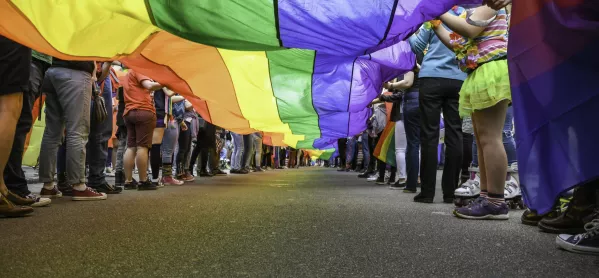- Home
- Schools still see the LGBT community as a distant enclave
Schools still see the LGBT community as a distant enclave

July saw the government publish its LGBT Action Plan 2018. The strategy paper acknowledges that despite the UK being consistently ranked as one of the best countries in Europe for its LGBT rights, the LGBT community still faces barriers to full participation in public life. And by participation, this includes how comfortable our community is doing something as simple as holding hands with our partners without the fear of abuse.
It has long been a requirement for trainee teachers, and practising educators, to be versed in inclusive teaching practices; students are diverse and teaching needs to be adaptable to such diversity.
However, for the action plan to be truly embedded into inclusive teaching practices, school leaders need to embody, model and support classroom teachers to be confident in talking specifically about LGBT matters.
The need for ensuring teachers are confident talking about diversity comes from the continuous conversations I have with classroom teachers who understand the need to talk about the LGBT community with pupils but feel ill-equipped, if not fearful, about how to handle the subject.
The fact two in five LGBT pupils were never taught anything about LGBT matters is therefore shocking but unsurprising. As such, policy and action plans provide positive platforms for change but real shifts come from the classroom - and those shifts need to be fear free.
Often this comes from a fear of a backlash from parents, carers and school leaders making teachers feel at odds with the school community’s culture - particularly in inner-city or rural communities.
Horrendously, this comes from the continuous conflation of sex and sexuality: that talking about sexuality means teachers are talking about their sex life. As such, it meant I, and other teachers who sought to be LGBT role models to pupils, felt that discussing LGBT matters lay in an unclear area of potentially unacceptable subject matter ingrained by the school culture, which often spoke about the LGBT community as the “other”. It existed, but not around these parts. It happened, but it wasn’t “our normal”.
I hear from teachers, and understand from my own teaching experience, the idea of LGBT people existing in some far-removed enclave, or not existing at all, leads to damaging self-image for pupils who identify as LGBT.
This is reinforced when homophobic language and bullying goes unchallenged, and when pupils observe dogmatic ignorant views outside of school in the community. As it is largely accepted that teachers have some of the greatest input into pupils’ belief system, meaning it is important what teachers talk, or don’t talk, about to pupils as they take this with them.
Teachers are one of the most influential role models we have during those key years as we form our understanding of the world - providing much more than just academic learning.
However, we can’t over-rely on initial teacher training to ensure teachers feel confident talking about LGBT. While it is not just school leaders who make a school culture they are often the architects.
Ensuring leaders model inclusivity and acceptance of everyone doesn’t just provide examples of positive behaviours to pupils, but creates the stage for teachers to feel confident, empowered and supported to talk openly about something perfectly usual - our identity.
The positive impacts go further: ensuring teachers feel confident to talk and teach about diversity and how everyone is part of the school community is intrinsically tied to positive mental health - for both staff and pupils.
Sexuality is intrinsically tied to our identity and when exploration around the subject is omitted or ignored, both teachers and pupils associate negative connotations to being openly out, for fear of criticism. School leaders actively confronting, training and, most importantly, modelling to classroom teachers conversations grounded in openness and acceptance means both staff and pupils can feel comfortable in owning their sense of self - a key characteristic in high-performing adults and children.
It is that chance of owning our identity without fear that the LGBT Action Plan seeks to address, but let’s be determined for it not to float in the ether as a policy that never touches the classroom. The Government Equalities Office needs to support and offer guidance to school leaders on how to make the necessary changes for children going through some of their most important identity-forming years and enabling confident, informed teachers.
Sean Finch is a former secondary school teacher in Manchester who now builds partnerships with educational leaders in Lancashire and West Yorkshire for Ambition School Leadership
Keep reading for just £1 per month
You've reached your limit of free articles this month. Subscribe for £1 per month for three months and get:
- Unlimited access to all Tes magazine content
- Exclusive subscriber-only stories
- Award-winning email newsletters